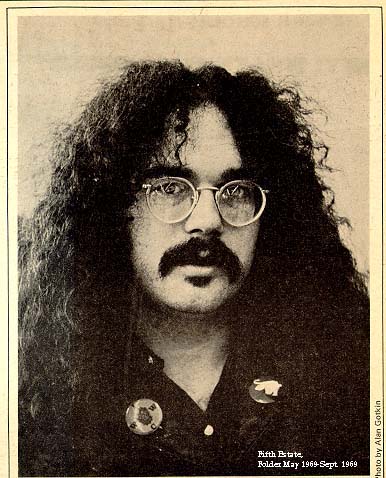John Sinclair was born October 2, 1941 in Flint, Michigan and grew up in nearby Davison where he graduated from high school in 1959. He attended Albion College (1959-1961) and the University of Michigan, Flint College (1962-1964), where he received an A.B. degree in American Literature. In April 1964 he entered graduate school at Wayne State University. He completed course work for an M.A. in American Literature (his thesis was on William Burroughs’
Naked Lunch) before dropping out in the fall of 1965 to pursue his activities in the Detroit jazz and poetry community.
On November 1, 1964, shortly after his first arrest for “sales and possession of marijuana,” Sinclair founded (with his partner Leni Arndt, poet/film-maker Robin Eichele, trumpeter Charles Moore and twelve others) the Detroit Artists’ Workshop, which was a local attempt in self determination for artists of all disciplines. Sinclair was sentenced on February 24, 1966 to six months in the Detroit House of Correction for a second arrest
(October 1965). Following his release he became associated with the Grande Ballroom in Detroit (October 1966) but was arrested a third time on January 24, 1967, with 55 other people.
In February 1967 Sinclair organized (with his partner and wife Leni Arndt Sinclair and artist Gary Grimshaw) a “total cooperative tribal living and working commune,” Trans-Love Energies Unlimited, as an attempt to consolidate the energies of the developing counterculture. Trans-Love produced dance concerts, rock and roll, light shows, books, pamphlets, posters, and the Warren-Forest Sun newspaper, and served as a cooperative booking agency for rock groups including the MC-5, the Stooges, and Billy C. and the Sunshine.
Deeply influenced by the Black Panther leaders Huey Newton and Eldridge Cleaver, Sinclair (with Pun Plamondon) founded the
White Panther Party in November 1968, serving first as its minister of information and later as chairman. The ten-point program of the White Panther Party demanded economic and cultural freedom. “Everything free for everybody!” and a total “assault” on the culture by any means necessary were the essence of the White Panther program.
In July 1969 Sinclair was sentenced to prison for 10 years for possession of two marijuana cigarettes. While in prison he assembled and wrote
Guitar Army and published another collection of writings, Music
and Politics, co-authored by Robert Levin. His prolific writings appeared in numerous publications and made him a national symbol more influential than ever before. Two and a half years of legal and political battles culminated at Crisler Arena in Ann Arbor on December 10, 1971, when 15,000 people attended the Free John Now Rally headlined by John Lennon and Yoko Ono. Just three days later, the Michigan Supreme Court, on its own motion, ordered Sinclair released and later overturned his conviction, upholding his contention that Michigan’s marijuana statutes were unconstitutional and void.
On April 30, 1971, the White Panther Party dissolved to form the Rainbow People’s Party. Chaired by Sinclair, the Rainbow People’s Party embraced Marxism-Leninism as its guide to action and concentrated on building a strong local political organization to promote the revolutionary struggle for a “communal, classless, anti-imperialist, anti-racist, and anti-sexist... culture of liberation...”

